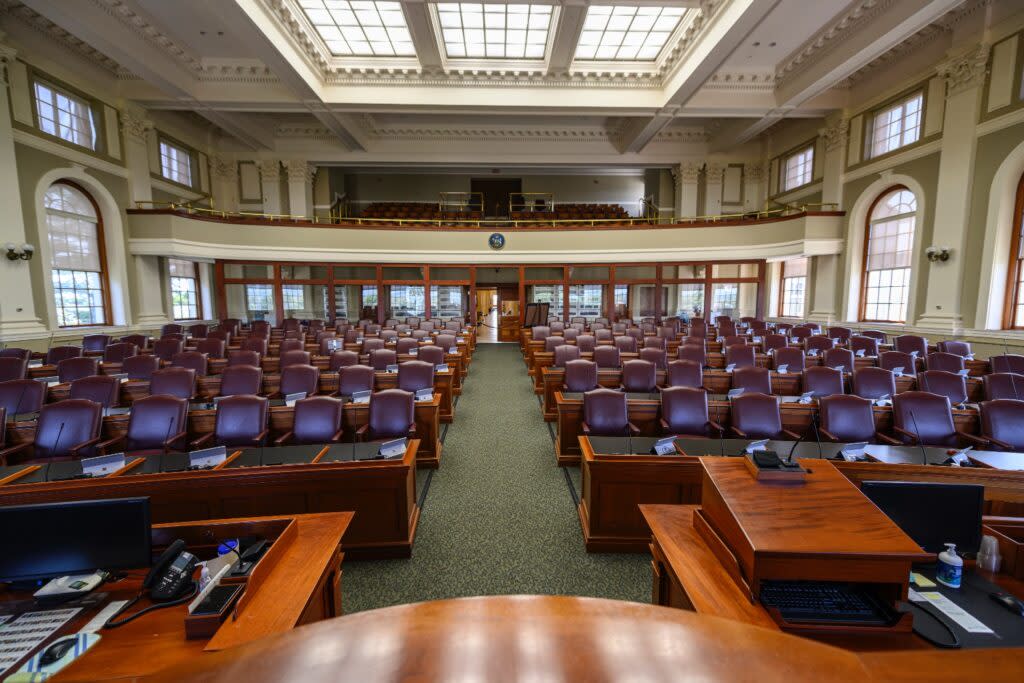Maine Legislature adjourns without definitive action on dozens of bills

- Oops!Something went wrong.Please try again later.
View from the speaker's dais of the chamber of the House of Representatives in the Maine State House in Augusta. (Jim Neuger/ Maine Morning Star)
Reflecting on moments of bipartisanship and the tragedies that drove much of their work, members of the Maine Legislature adjourned for the year on Friday night.
However, the Maine House of Representatives concluded without taking action on dozens of bills.
Earlier in the week, the budget committee had opened up the possibility of enacting 80 bills left between passage and funding, but Gov. Janet Mills came out in strong opposition to any further spending.
Lawmakers sent about 30 of those bills to the governor’s desk Friday afternoon. Mills now has 10 days to sign this legislation, otherwise it will not become law.
However, many more bills still remained in limbo as they needed final approval from the House, which took a break to caucus around 1 p.m. and did not reconvene until a little after 9 p.m.
House Majority Leader Maureen Terry of Gorham was brought to tears in her final remarks on the floor, as she thanked her colleagues and Republican counterpart, Minority Leader Billy Bob Faulkingham of Winter Harbor, for sharing a commitment to the Maine people.
“Although we’ve been on opposite sides on many, many issues, it’s easy to forget the times we’ve been on the same side,” Faulkingham said in response. As an example, he mentioned the law passed in 2021 with bipartisan support ending civil asset forfeiture in Maine.
While the Democratic majority and Republican minority were at odds over several issues this session — including reproductive rights, a shield law, a vehicle emissions rule, the national popular vote and the budget at large — the Legislature worked in a bipartisan fashion to pass legislation that will expand tribal authority over prosecuting crimes, increase drug treatment options, and better fund nursing homes, among other measures.
Ending his remarks, Faulkingham joked, “I present to you the first House Republican majority since 2012.”
Given the significant number of absent lawmakers, there was a question Friday as to whether Democrats in the House had enough support to enact the bills advanced by the Senate in the afternoon. Two-thirds support of those present in the chamber was needed to enact the measures.
Of the bills the budget-making Appropriations and Financial Affairs Committee voted in favor of funding earlier in the week, the committee made changes to 50, which then needed to be approved again by both chambers. The Senate approved most of these amended bills by Friday afternoon, but ultimately, the House decided to conclude work without ever taking them up for consideration.
Among these measures that died upon adjournment include proposals to create an advisory council to ensure African American and Wabanaki studies requirements are effectively taught in schools, start a pilot project to help alleviate the staffing crisis in the child welfare system, require MaineCare reimbursement for treatment for emotional dysregulation disorders, and fund free health clinics, among others.
GET THE MORNING HEADLINES DELIVERED TO YOUR INBOX
This is in contrast to the 30 bills the committee advanced without amendments, which only needed enactment votes in the Senate. While the Senate wrapped much of its work earlier in the day, it reversed one of its earlier decisions when reconvening Friday evening.
After originally voting down a bill to delay a ballot measure on a new state flag proposal, the senate later reconsidered the decision and reversed its stance. With a vote 18-12, the Senate ultimately passed the measure, which will push the referendum question from the upcoming November election to November 2026 and establish a commission to assist the Secretary of State in determining the design of the flag.
This year was the second regular session of the 131st Legislature and began in the wake of the worst mass shooting in Maine’s history, after which lawmakers vowed to take action to ensure that such a preventable tragedy would never happen again. While several efforts to reform gun laws were introduced, two became law.
In remarks on the House floor Friday, Gov. Janet Mills thanked lawmakers for their dedication after the tragedy, as well as in light of the series of devastating storms in December and January that many communities are still working to recover from.
“We painstakingly wrote bill language to try to address these challenges, negotiating to find compromise, sometimes successfully, sometimes not,” Mills said.
The Legislature included funding to help communities rebuild after these storms in the supplemental budget, though Mills had initially wanted the storm relief to be separate.
“Although no one got everything they wanted, we honored the promise of Maine in those moments,” Mills said, “a promise that public servants from different backgrounds and beliefs from around the state will come together to do everything we can to make life better for our neighbors, for our communities, and for our state.”
Laws passed during this session will go into effect on Aug. 9, except for emergency measures, which took effect upon the governor’s signature or as otherwise specified in the bill text.
The Legislature adjourned finally just after 10 p.m., following a motion from Democratic Rep. Margaret Craven of Lewiston.
“Is this the pleasure of the House?” Talbot Ross asked one final time. “It is a vote.”
The post Maine Legislature adjourns without definitive action on dozens of bills appeared first on Maine Morning Star.

